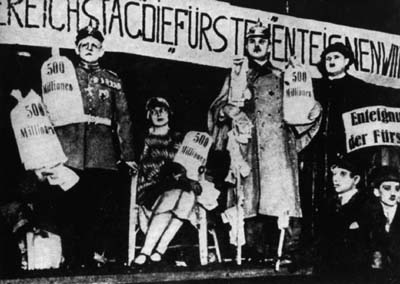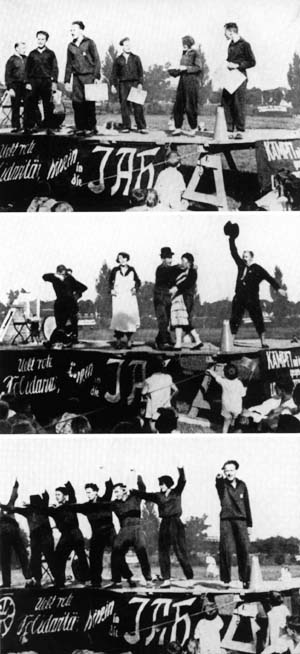A
short history of the early workers theatre
In 1860's Germany, several educative clubs
for workers started up, some of which called themselves: "Co-operatives
for the acquisition and increase of intellectual capital". It was the
hope of the various leaders of this movement that once workers educated
themselves, the capitalists could no longer dare to offer them such
exploitative wages. Whilst some workers'clubs, like the ADAV, which was based
on Lasalle's ideas (Lasalle was an aristocrat who agitated on behalf of the
workers, but who was dismissed by the left wing politicians as a mere dandy)
considered 'self-help' (Selbsthilfe) as unsuitable for the betterment of
workers' living conditions (they argued that the cause for impoverishment did
not lie within the working class itself), other organisations (VDAV) saw
self-help as the only possible way out of the dilemma.
The workers' theatre eschewed upper class amateur theatre and its audiences,
and instead shifted the emphasis entirely to the lower classes of society,
whilst in the beginning adapting forms of courtly and bourgeois amateur
theatre to its own needs. "Tableaux Vivants" were not uncommon in
those days. Another model was found in so-called "festival
productions". These had their origin in the medieval mystery plays, or in
festivals of the Renaissance, where a certain historical event was celebrated
on a given day. Often such plays would anticipate the awaited victory and put
visions of a better future on to the stage. The plays thrived on a strong
sense of dualism, expressed in the form of hostilities between opposing
historical parties, as well as in the juxtaposition of a backward-looking
interpretation of history with visionary promises of the future.

But it all started out quite simply. When the first volume of Karl Marx’s
"Das Kapital" was published in 1867, Mr J.B.v. Schweitzer studied
it thoroughly and published the results in the newspaper
"Social-Demokrat". In order to make the text's more difficult
thoughts comprehensible to the newspaper's readers, he used the form of a
dialogue, or a disputation between two characters. This written debate,
called „Schlingel„, was not originally intended for the stage or live
performance. Nevertheless, it began to be performed here and there as a piece
in German workers’ clubs. Because some of the text was too lengthy or
theoretical, Schweitzer published a version adapted for the stage. (The piece
nonetheless remained more of a ‘Lesedrama’ or proclamation, and was intended
to be read rather than to be acted on stage. It was often performed as part
of a longer evening with a variety of different recitations.) Up until 1878,
this was the only attempt to confront the workers with the relevancy of
Marx’s economic theory. More workers and functionaries were introduced to
Marx's ideas through these performances than through the book itself. "Das
Kapital" sold very badly to begin with. In 1867, only 100 copies had
been ordered, although by 1871, most of the 1st edition of 1000 was sold. But
by that time, the „Schlingel„ had been performed at least 15 times, which
indicates that about 1500 to 3000 people learnt about the important theories
of "DasKapital" for the first time through the performance.
However, long and argumentative debates were clearly not particularly
entertaining. They were straightforward readings, slightly disguised with
theatrical means. Their rhetoric and didactic literature were useful for
purposes of agitation, but they included no action that could guarantee an
entertaining stage play. Otto Walster considered these problems in "An
Unsuccessful Agitator,or the Question of Real Estate", where he wrote an
effective comedy, that included political debates and speeches, but only to a
certain extent. Satisfying the need for entertainment was the major concern
here; however, the piece did not in any way neglect actual political debates.
Unfortunately, the play was not often performed in Germany. It was however
published in 1877 in St Louis and performed by a New York workers’ theatre in
the same year. German workers’ clubs in the United States had their own
newspapers and the structure of their festivals was similar to that of the
clubs in Germany. The ‘Volksbote’ in Chicago reported a huge ‘Tableax Vivant’
that was performed in front of some 2500-3000 cheering workers in the 1880’s.

Between 1880 and 1900, theatre by workers for
workers was popular with the workers themselves and also an important tool
for self-education (in language, rhetoric and articulacy). Nevertheless, the
various plays and recitals were considered to be a waste of time by the
socialist and communist parties, whilst state authorities regarded them as
highly dangerous agitation and therefore censored and banned the
performances. From 1890 onwards, the movement of the German system of
"Volksbühne"(people’s stage) became a highly dangerous competitor
to the self-made theatres of the workers. These stages were worked
professionally and dismissed the concept of agitation. Their aim was rather
to attempt to attract a new class of low wage white collar workers with more
or less populistic and socially oriented productions. Instead of making an
independent theatre, with the idea of entertaining and educating themselves
and others (education & agitation), the workers were to be attracted by
entertainment alone in the framework of bourgeois sentiment.
Nonetheless, smaller groups maintained the earlier, more left wing approaches
of the first workers’ clubs. They became important models for the development
of the „agit-prop-troops" in the 1920s.
One of the first "professional agitation troupes" was Boreslav
Strzelewicz's "Gesellschaft Vorwärts" ("progress
society"), a small troupe of three people who toured different workers
clubs, theatres and festivals. Their programme included songs and poetry
recitals, but also short farces and comedies, most of them written by
Strzelewicz himself. The troupe could react quickly to local events in the
places they visited, and incorporate current political developments
immediately into their programme. In order to address their audience more
directly, names and locations were left open in their scripts to be filled in
on arrival at the location. For example, one of their titles read:
"Despite the presence of the police, XX was swamped with pamphlets on
the following morning." The "XX" could be filled in with names
appropriate to the region the troupe was currently visiting. The troupe
members themselves often used everday costumes like police uniforms in order
to insert themselves into their audiences’s daily problems.
The „Gesellschaft Vorwärts" stayed together until 1914. Their songs,
poems and farces were not primarily instructive and informative but tended
more to be emotional and full of pathos. Their work was not strictly
political and agitative, but nevertheless, their idea of a revue with variety
of different acts provided an entertaining structure for propagating
socialist issues. Such a "Nummernprogramm" (or, varied programme)
could free itself from the „unity of action" demanded by classical
bourgeois theatre. News and other printed matter of political relevance just
needed to be put into the form of a dialogue or worked into a montage. Thus
the troupe paved the way to the political revue which developed in the years
following the First World War.
The development of epic theatre can be traced from the early proletarian
festivals and the "Bunte Abende" (social nights) of the
"workers’ (self-) help" through to the variety-programming of the
troupe "Vorwärts" and chorus chants, right up to the more widely
known theatre of 1920/30s:- the Proletkult troops and Agitprop, as well as
the revolutionaries of the bourgeois theatre, Piscator and Brecht.
------------- --------------------
after Peter
von Rüden: Sozialdemokratisches Arbeitertheater (1848-1914) | 1973 Athenäum
Verlag Frankfurt am Main
|